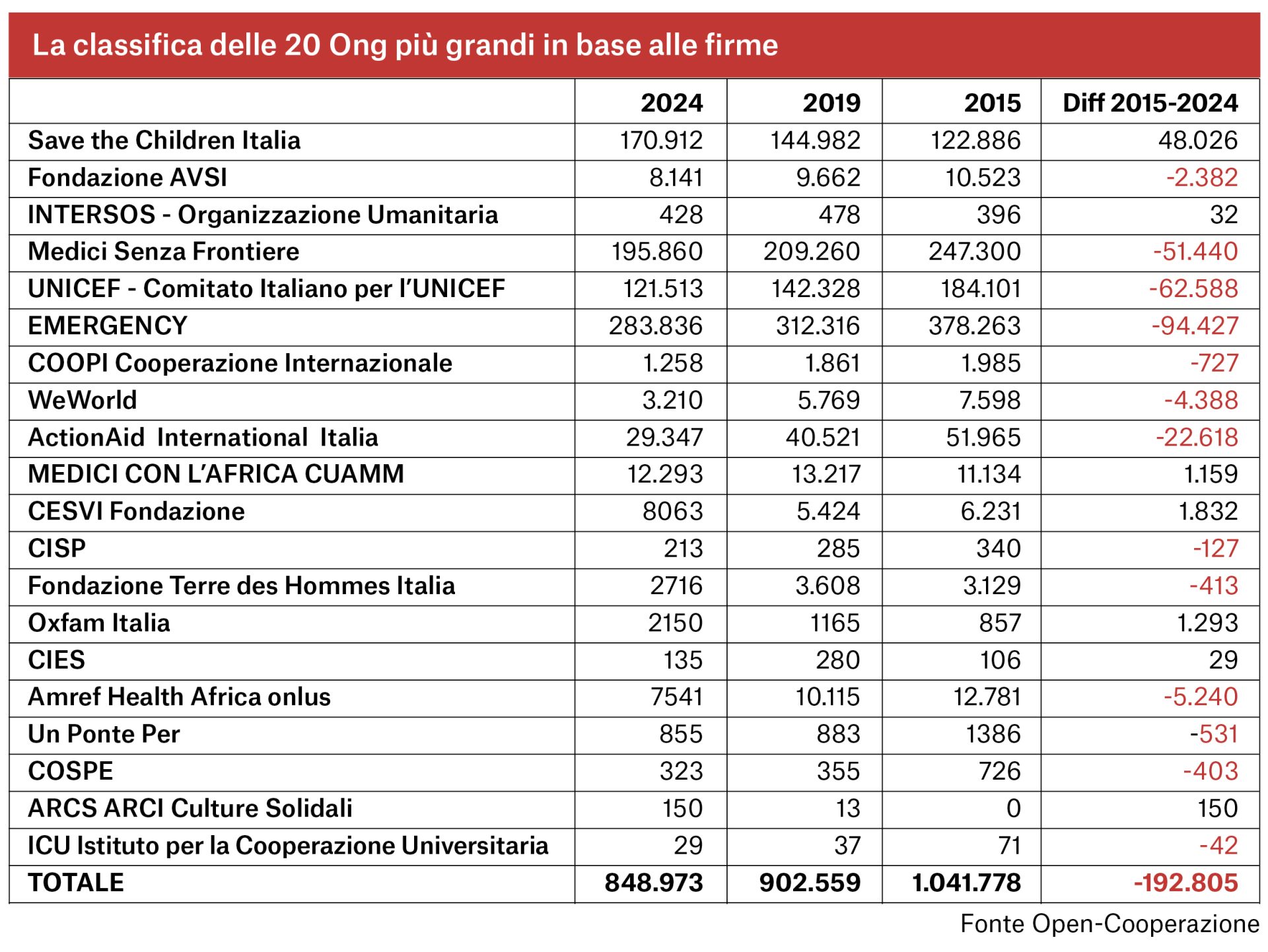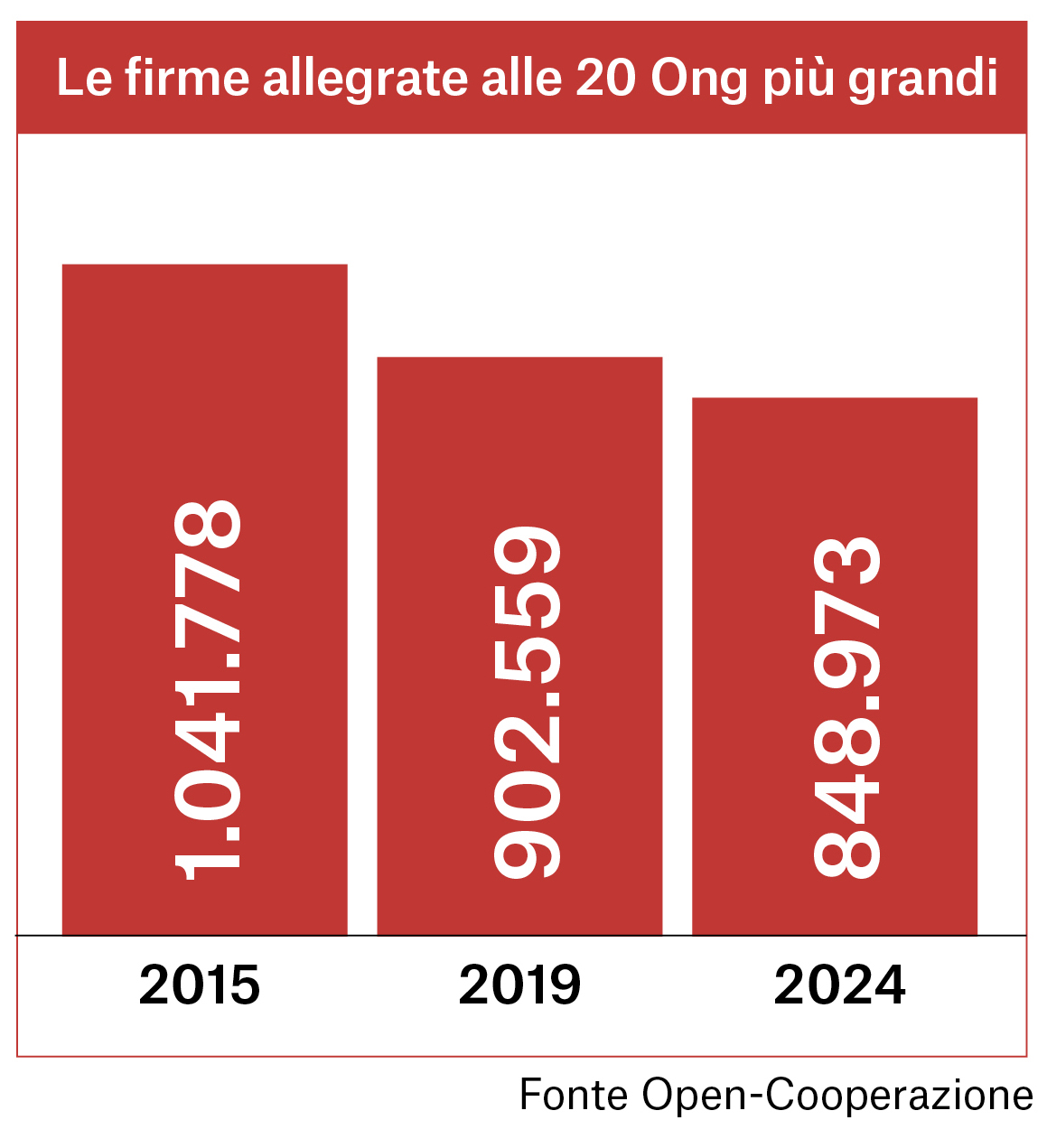5 per thousand: the crisis of international cooperation

The 5 per thousand marks a historic record in 2024: almost 18 million Italians have chosen to allocate a portion of their taxes to charities, with 714 thousand more signatures than the previous year. An unprecedented sign of generosity and civil participation. However, behind this growth lies a less positive reality for a crucial sector: international development cooperation.
NGOs that operate in development projects and humanitarian interventions remain on the margins of the flow of 5 per thousand destinations and donations, unable to fully intercept the growing wave of solidarity that is crossing the country. There are several factors that explain this gap, starting with the public perception of "great needs".
Here is the summary table of the trend of preferences obtained in the last 10 years by the 20 largest Italian development cooperation organizations based on their 2023 revenue balance sheets (source Open Cooperazione ).


The 5 per thousand data show a stable and clear hierarchy: health is the priority perceived by Italians, driven by the pandemic experience and widespread awareness of the value of prevention and treatment. Organizations operating in the healthcare sector continue to collect a significant share of preferences.
On the contrary, development cooperation, with its projects aimed mainly at countries in the South of the world, is perceived as distant, less urgent and not very “close” to everyday life.
In this sense, the narrative that cooperation is increasingly assuming, driven by initiatives with a strong economic and business-oriented character, such as the Italian Mattei Plan and the European Global Gateway, is not helpful. A narrative that progressively risks distorting the nature and values of development cooperation and making public opinion perceive that their support is no longer necessary or a priority.
In recent years, the international cooperation sector has been at the center of a heated public and media debate, often animated by accusations regarding the management of resources, operating costs and methods of intervention. The campaign against NGOs involved in rescue operations in the Mediterranean has fueled suspicion and mistrust, with a tangible impact on the image of the entire sector.
This context of attacks and controversies has undermined the confidence of many potential 5 per thousand donors, who prefer to orient their choices towards organizations perceived as more transparent, safe and “close”, leaving international cooperation in a disadvantageous position.
Surprisingly, neither the war in Ukraine nor Gaza have led to a significant increase in donations to development cooperation NGOs. Humanitarian emergencies, which in the past managed to attract the attention and generosity of Italians, today seem to suffer from a form of collective fatigue.
At a time when we are witnessing the greatest reduction in institutional funding – first and foremost the United States, but followed by several countries such as the Netherlands, Germany and the United Kingdom – the possibility of accessing flexible funds such as the 5 per thousand becomes essential to respond to the ongoing humanitarian crises.
The 2024 result is a clear alarm bell for the world of Italian development cooperation. We need to overcome the current fragmentation of the sector and build communication campaigns that create an alternative narrative that represents the countries of the global south in a new, decolonized and equal way but that manages to enhance the key role that development cooperation still has in these contexts today.
Credi Foto Avsi: a development project for women in Burundi
The authors of this article are Elias Gerovasi, curator of Info Cooperazione and Tiziano Blasi, director of Soleterre Programs
- Tags:
- 5 per thousand
- Donations
- tax
You read this article freely, without being blocked after the first few lines. Did you like it? Did you find it interesting and useful? VITA's online articles are largely accessible for free. We want it to be this way forever, because information is everyone's right. And we can do it thanks to the support of those who subscribe.
Vita.it





